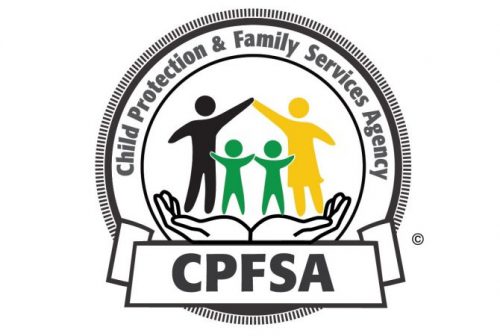Children Have A Right To Care And Protection
By: , May 20, 2021The Full Story
Children in Jamaica have a right to be protected from abuse and harm, and those rights are safeguarded in the Child Care and Protection Act (CCPA), which came into effect in 2004.
The legislation promotes the safety and well-being of children across the country.
Children’s Officer at the Child Protection and Family Services Agency (CPFSA), Carolyn Beckford, said that the Act provides a comprehensive framework for the care and protection of all children from 0-18 years.

“It promotes an integrated approach to both protecting children from abuse and promoting their welfare,” she noted, while addressing a virtual event staged by the Jamaica Constabulary Force (JCF) Medical Services Branch Counselling Department recently.
Child abuse is any act or failure to act on the part of a parent or caretaker, which results in death, serious physical or emotional harm to a child; sexual abuse or exploitation of a child.
Any act, or failure to act, which presents an imminent risk of serious harm to a child, also counts as child abuse.
Abuses against children include physical, emotional and sexual harm and neglect.
Ms. Beckford said that children are entitled to protection from abuse, neglect and harm.
She noted that while the family is the preferred environment for the child, as it is where they best thrive, the State will step in if they are deemed to be in need of protection and care.
She said that under Section 8 of the CCPA, a child in need of care or protection would be: a child who has no parent or guardian or has a parent or guardian unfit to exercise proper care and guardianship; a child exposed to moral danger, that is, being destitute, wandering without any settled place of abode and without any visible means of subsistence, begging or receiving alms, or loitering for that purpose.
A child is also in need of protection if he/she is being cared for in circumstances that seriously impact the child’s physical, mental and emotional health, or is exposed to significant risks.
“If the child lives in a household with another child who has been a victim of an offence, that would also warrant red flags because as you know children live what they learn,” Ms. Beckford noted.
A child living in a household with a person who has been convicted of an offence is another indication of a child being in need of care and protection.
Ms. Beckford said that each person has the responsibility to be alert to the signs that indicate whether a child is in need of care and protection.
“Is there physical, mental, emotional or sexual abuse like incest, is the child a victim of violence, or is the child exposed to child labour, and by that I mean employed under the age of 13 years? No child under 13 years should be employed,” she pointed out.
There are also restrictions to the employment of children over 13 years. Ms. Beckford informed that children should not be engaged in any hazardous jobs, night work or the sale of liquor, or work that interferes with their education.
Meanwhile, Ms. Beckford said the CCPA creates a mandatory obligation to report instances in which it is suspected that a child has been, is being or is likely to be abandoned, neglected, physically or sexually ill-treated or is otherwise in need of care and protection.
She pointed out that all persons, and particularly prescribed persons, have a duty to make such reports.
Prescribed persons include but are not limited to healthcare workers, teaching professionals, social workers, children’s officers, and any other persons by virtue of their employment, who are affiliated or have the responsibility to provide care and protection to a child.
“We expect that all will abide by the policy of mandatory reporting. Prescribed persons are known by the nature of their jobs and they are expected to report abuse. Any person who fails to report is guilty of an offence,” Ms. Beckford said.
She informed that there are penalties under the law if duty of care is not exercised.
“Cruelty and neglect, if that is the violation, [there is a] $1 million fine or 12 months in prison is the penalty. If child labour is the violation, the fine is up to $500,000 or six months’ imprisonment at hard labour,” she said.
In addition, the Act states that “a person who has information that causes that person to suspect that a child is in need of care and protection and does not make a report to the [Children’s] Registry or other relevant authority, commits an offence and shall be liable upon summary conviction before a Resident Magistrate to a fine not exceeding $500,000 or to imprisonment to a term not exceeding six months or to both such fine and imprisonment.”
Also, if a person makes a false report, that person can be fined up to $250,000 or three months in prison.
“For serious offences, carnal abuse, murder, etc. the penalties for those serious offences attract harsh penalties, such as capital and non-capital punishment similar to those under the Offences Against the Person Act,” Ms. Beckford said.
To report child abuse or a missing child, persons may call, toll free, 1-888- PROTECT (776-8328); 876-948-2841-2; and report@childprotection.gov.jm.


